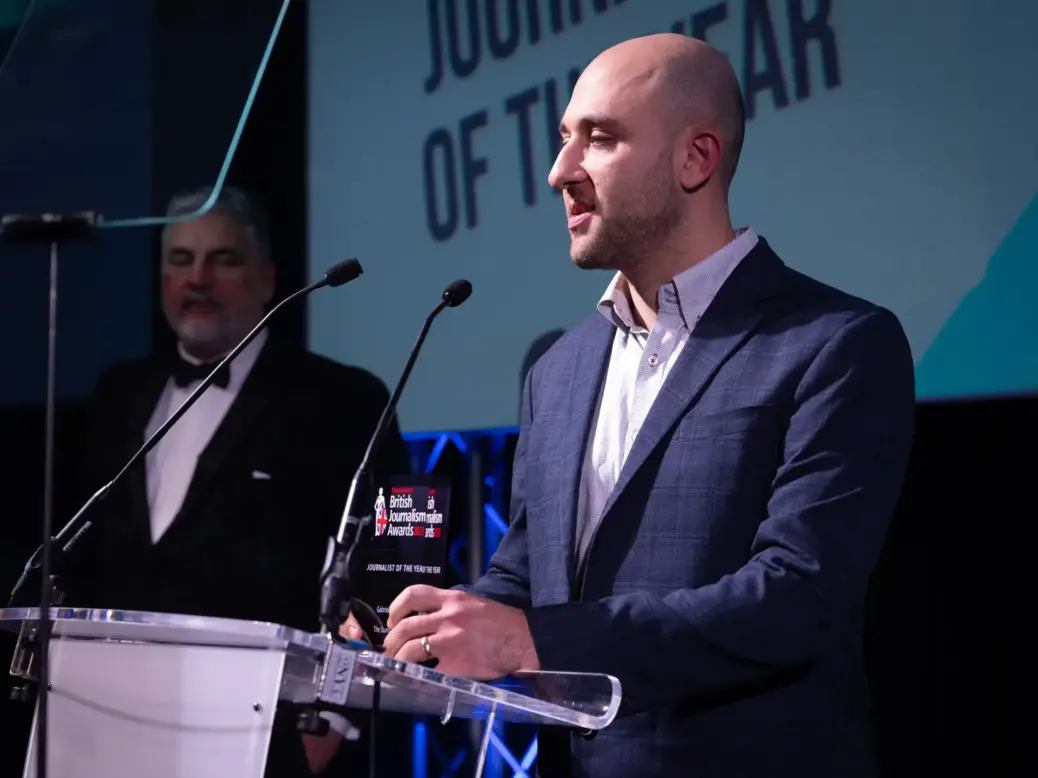
Investigative reporting is a “masochistic business” and only comes about “incredibly painfully”, according to Sunday Times Whitehall editor Gabriel Pogrund.
But Pogrund credited lawyers who get difficult stories over the line as he collected the Journalist of the Year prize at the British Journalism Awards 2023 in London on Thursday.
In a speech, Pogrund thanked Pia Sarma, editorial legal director at Times Newspapers, as well as Sunday Times editor Ben Taylor, deputy editor Krissi Murison, and head of news Lindsay McIntosh for backing tricky stories.
Speaking to Press Gazette shortly after his win, Pogrund said: “I have to say that investigative journalism never comes about anything other than incredibly painfully. It is a masochistic business.
“You’ve got to deal with legal threats, you’ve got to deal with things like the Official Secrets Act, libel and defamation law, and also just complexity – telling difficult stories requires a lot of patience – and it requires a lot of resource and investment. And I feel very, very proud and very fortunate to benefit from that at The Sunday Times.”
Again crediting Sarma, Pogrund continued: “It’s funny, we live in an ego-driven business and she and all of our lawyers actually get so little recognition, but especially in a country where, you know, we don’t have a First Amendment or a legal system that favours reporting so you have to have brilliant lawyers and committed editors who are willing to subject themselves to months of conceptual gymnastics and the evolution of a story and they have to be willing to stage an intervention and put themselves in the line for that.”
‘Onus on journalists’ in UK libel law
Sarma told a conference earlier this year that the UK remains the “libel capital of the world”.
As an example even in the days after Pogrund’s win, Conservative peer Michelle Mone admitted she had lied to the press about the fact she stands to gain financially from a PPE deal with the Government during the Covid-19 pandemic despite the fact her lawyers sent threatening letters to publications including the Daily Mail, The Guardian, The New European and Byline Times warning it would be “defamatory” and actionable to report such claims.
Also this weekend Financial Times investigative reporter Miles Johnson noted that Italian fund manager Raffaele Mincione, sentenced to five years and six months in prison for embezzlement and money laundering, had “spent years using expensive London libel lawyers and PR firms to attack our reporting about his role in a bungled Vatican property deal”.
The UK Government has promised to crack down on strategic litigation against public participation, known as SLAPPs, meaning legal threats designed to intimidate journalists into dropping their reporting of potentially damaging allegations.
Pogrund told Press Gazette that SLAPPs is a “pretty ill-defined term, but it’s so important we’re having the conversation we are about it at the moment”.
He cited his own example of such a threat, which took place after The Sunday Times revealed former Conservative MP Charlie Elphicke had been accused of sexual assault. He has since been convicted and served half of a two-year prison sentence.
Pogrund said: “He sued us before, during and after his time living at Her Majesty’s pleasure in prison, and I would pose questions about the legal system that enables that to happen.”
He added: “Whether or not that fully amounted to a SLAPP I don’t know, but I generally think that we sadly live in a country which hasn’t valued journalism enough for a long time and I think that the legal system is reflective of that.
“The onus is on journalists to prove the truth of what they say and when you’re doing investigative journalism with confidential sources, and often victims, that’s a very complicated thing to do. And I think that the Government’s looking at that and I hope that they make good on some of their commitments.”
Pogrund says ‘breadth in depth’ is ‘beauty’ of Sunday journalism
Pogrund won the Journalist of the Year recognition for work that included revealing alongside Sunday Times deputy political editor Harry Yorke that BBC chairman Richard Sharp had helped to arrange a loan for ex-PM Boris Johnson.
The British Journalism Awards judges described Pogrund as a “prolific scoop-getter whose reporting helped topple the chairman of the BBC after exposing murky financial details involving the prime minister.
“He also revealed the presence of a paid lobbyist as a close aide to short-lived UK premier Liz Truss and prompted the resignation of chief whip Gavin Williamson over bullying allegations.
“He has also shown his range with deep reporting on an untold tragedy at the heart of Britain’s secret intelligence community.”
Pogrund told Press Gazette: “I have to say one of the things I love about being a Sunday newspaper is the breadth that it affords me, and I feel so blessed to be able to have a day job where one day I’m reporting on the secret services, the next Gavin Williamson, and then the BBC. I mean, what a pleasure.
“You know, everyone says about journalism ‘it sure beats work for a living’ and I genuinely feel that way when, I mean, we’re all generalists, or a lot of us are in journalism, and to be able to cover breadth in depth is basically the beauty of Sunday journalism and I’m glad that it’s a tradition that The Sunday Times has kept alive.”
Email pged@pressgazette.co.uk to point out mistakes, provide story tips or send in a letter for publication on our "Letters Page" blog
